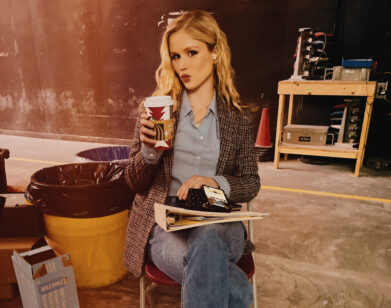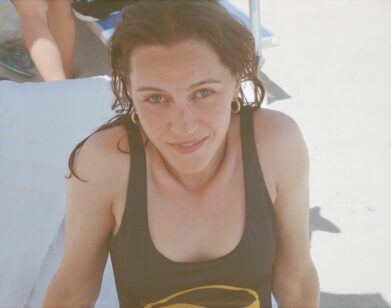BALLET
Wu-Tang Clan’s RZA Takes Alexis Ffrench Behind the Scenes Of His First Classical Album

Alexis Ffrench and RZA, courtesy of Ashley Osborn/Platoon.
Founding member of Wu-Tang Clan, Robert Fitzgerald Diggs, (aka RZA), is back with his first ever classical album, a ballet score inspired by the artist’s recovered notebooks from childhood. “They were talking about young love, exploration, the first time smoking a blunt, drinking,” he recalls. A Ballet Through Mud, which is out August 30th, explores the fictional evolution of the characters he grew up with at his Staten Island high school, imagining the kind of heartbreak and growth they might have experienced as they grew older. The rapper found an outlet for his love of composition shortly after Wu-Tang Clan won their first Grammy, taking his first steps into the world of film when he scored Jim Jarmusch’s Ghost Dog: The Way of the Samurai and later Quentin Tarantino’s Kill Bill (Volume 1 and 2). Last month, the legendary producer hosted a listening session of the new album in L.A and later joined fellow composer and proder Alexis Ffrench at the Dolby Screening Room to talk about improvisation, his enduring love for physical instruments, and how he keeps it Zen.
———
FFRENCH: That was a tour de force. It was just extraordinary.
RZA: Thank you.
FFRENCH: Such contrast and deftness, in terms of the different movements and characters. But I particularly enjoyed the interplay between the orchestral instruments. There were so many nods and winks–I was hearing Rimsky-Korsakov and Rachmaninoff in some places, and I was left thinking, “What does this man listen to?” Because it’s utterly dizzying, the level of achievement and skill. So Bravo, first of all.
RZA: Thank you, thank you.
FFRENCH: I’ve been immersing myself in your world for the last week, listening to this extraordinary album but also listening to the Wu-Tang Clan catalog, because I wanted to understand that intersection. I started reading A Ballet Through Mud, the notebooks you wrote when you were 14 years old, and I heard that it was in the pandemic that you returned to them and that’s where this project spawned from. Could you walk us through the genesis of this?
RZA: Definitely. Well, we’re really striving to produce music and tracks that we can rap to. We’re usually digging through crates of records, whether they’re soul samples, rock, funk, classical, and we take these and put them to rhythm. During that process, I learned a certain language of musical communication. 3/4 or 4/4 timing, or the tempo, quantization, truncating, all these different terminologies became my addiction. Then during the pandemic when I was stuck in the crib, I found this book that had lyrics that were pre-Wu-Tang, from the age of 14 to 19. They were talking about young love, exploration, the first time smoking a blunt, drinking. And my high school diary is a book full of rhymes, so I was like, “I should find a way to put music to it.” I went to a high school in Staten Island, Curtis High School. We had a nice blend of people, but a lot of my homies were my white boys hanging, so a lot of the characters in the head will have these white names. So it goes, “Sue was this girl, was really quite fly. Brad was real cool, and he was her guy. Lisa was freaky. She loved to have sex. Her brother name was Dexter, but they called him Dex. His sister name was Monica, and she was a verge. Joe was just their friend, and he was a nerd. Brad bought the beer. Sue bought the smoke. Lisa had the sheets. Dexter had Coke. But Joe was the type who didn’t get high, nor did Monica, but she was willing to try. So Brad lit the joint, and passed it to Joe, saying, ‘Come on, man, smoke it.’ And Joe said, ‘No.’ ‘What’s wrong? Are you scared?” was asked by Sue. ‘Oh, you just a nerd?’ Joe said, ‘That’s not true.’ Then Monica said, ‘Yo, just have a taste,’ as she puffed on the joint and blew smoke in his face. Now, on Monica, Joe had a crush. He didn’t want to smoke the joint but felt that he must. Like many, we know love made him a fool, so he smoked the joint to prove he was cool.”
FFRENCH: Man, man.
RZA: But anyway, that’s like 14, 15-year-old thinking in the hood. But I took that and started to advance the story. I moved it up to a point where I looked at six college students who had been friends their whole life, and asked what would happen if friendship that was platonic later becomes engaged in relationship? Will love revive? Will love arise from that, or will darkness arise? And in a way, there’s a little mud there. Our lead character of this ballet starts off with the name of Ionian. Ionian is a musical scale that is the C major.
FFRENCH: It’s the mood, yeah.
RZA: And if you make it minor, you end up with–
FFRENCH: Well, you tell me.
RZA: Aeolian, which is the A minor. And so, throughout the music you all just heard, we are listening to someone who had this major mode go into minor mode but then at the end, resolving back to the major mode. So that was the synopsis, and every song and every track that’s on here helped to tell that story.

Alexis Ffrench and RZA, courtesy of Ashley Osborn/Platoon.
FFRENCH: But in terms of your listening, how wide is it? I get the impression that you listen forensically.
RZA: To be frank, I’ve absorbed so much music over the years that now it’s just in me. By understanding music theory from listening so much, and having a lyrical vocabulary from my reality, it just flows in that way now. I’m always trying to tell a story, and sometimes it’s happy or it’s sad. It’s like we started in a simple C minor. Now I’m going to go to the diminished then, then come back to the A, right? Then diminish it again.
FFRENCH: So your writing process is largely improvisatory?
RZA: Yeah.
FFRENCH: And I read that you gave yourself a crash course in classical orchestration and composition.
RZA: Mm-hmm.
FFRENCH: How did you glean an understanding, not only of register and pitch but of color, so the things that instruments can imbue a piece of music?
RZA: Thank you for pointing that out. That really comes from Hollywood composing. If you go back and you study the greats like, let’s say Bernard Herrmann, where maybe he’s doing flute, cello, and vibes. Maybe I move the vibe, and I just use the clock because I don’t want it to sound like jazz. If I wanted to catch a jazz feel, I would’ve had the vibe. But there is some vibraphone in some of those tracks. And colorization has been already documented by a lot of great film composers. Of course, I know you’ve heard of [Ennio] Morricone.
FFRENCH: I knew Morricone, indeed.
RZA: By being a big fan of his I understand that, it’s really your ear. There is a science to it that you can write it out. Good composers, especially in the ancient days, didn’t have DAW. They didn’t have Pro Tools or a keyboard that had 20 sounds on it. They just had paper and pen, and their imagination. But now we are blessed with technology, so I can actually put the oboe with the tuba and see what happens. But I wanted to make sure I captured the story of emotions that are usually just said in lyrics. You hear a song like Wu-Tang Clan “Ain’t Nuthin Ta F’ Wit,” you hear the anger. Then you hear a song like “Tears,” where it’s, “oh man, how do I say goodbye to my brother who got shot?” But how do we invoke all that energy without words or film? If anybody took a nap, it’s all good, but the point is I wanted you to feel it. Hopefully, somebody saw something that you wouldn’t have normally seen, as this music is moving around you. That was the ambition.
FFRENCH: 100%. It was compelling. It held me, and I know it held everyone in the audience for the full duration. This is highly deft. This is considered to be music of the classical elites. There will no doubt be some detractors who say, “Who is RZA to be working in this way?” And it’s interesting because these kinds of accusations have been around forever. Going back to the 18th-century, Voltaire said to one of the greatest black composers, Chevalier de Saint-Georges, “He’s merely a mimic,” when he was writing some of the greatest music of all time. But black classical composers have always been around. And interestingly, when Martin Luther King chose to construct his speeches in the car, he often listened to opera, Donizetti. What I wanted to ask is, why is this music your most sincere form of expression at this moment in time?
RZA: I think it’s an evolution, right? If you go back and reference Wu-Tang on a song like “Can it Be,” you hear that G seven string opening up the track. That simple progression is, after the laughter comes tears, but I didn’t know that. I didn’t know that I could then just go to the A, then to the B, and then build back. Listen to a lot of my tracks. You’ll hear me sampling flutes and oboes and slowing them down and changing them. Now that I’m evolved enough to understand what I was seeking, I can strive to create it. This is probably going to sound soggy coming from me, but because of the success of hip-hop, people don’t play instruments anymore. It’s stupid because, at the end of the day, the instrument will be your self-expression. Right? It’ll be your discipline, your push.
FFRENCH: Yeah. The beauty is organic. You spoke about the accessibility of DAWs. Obviously, there’s been such a seismic shift, countless talented musicians in their bedrooms creating music in a homemade fashion. And that’s wonderful because I think it’s a human right for young people to be able to express themselves freely, not just in music as a medium, but in all arts. But by the same token, it has diminished the pool from which, say, more established conservatoires and organizations have been able to draw because there aren’t as many young people learning instruments. I’m not going to say ‘real instruments’ because producers will say, “This is my instrument.”
RZA: Yeah. The SRT was an instrument.
FFRENCH: Indeed. But we all know what we’re talking about: pianos, violins, and flutes. There are some sections of classical music that are thriving if you look at the proliferation of pop and classical. But when you were growing up, you didn’t have access. You didn’t know the potency of the magic you were creating, you did it because it’s intuitive. But if you could have your time again, what sort of training would you have liked to have had? And what would you do to remove the barriers to entry for young people now in terms of music education?

Alexis Ffrench and RZA, courtesy of Ashley Osborn/Platoon.
RZA: Well, I love the strings. If I were to reverse time I would’ve been a cello master, I think. For young people, it’s like, use everything that you have that’s to date, but don’t forget what was already there. You see what I mean?
FFRENCH: Yeah.
RZA: It’s like in martial arts, you could do all types of styles, but you gotta start with the basic stance. The basic stance are those instruments. My children all play instruments, and they make beats. By knowing the instrument, it helps them to define the beat. Look, it ain’t necessary to do, to make hits, and people do that. As we look at classical music, it’s almost like a duty. If you can evolve to the point to where you now recognize the beauty of it, I’m speaking about myself now, then I’m going to go out there and champion it for others. Maybe somebody don’t have to wait until they cross into their adulthood at 40s and 50 years old to start saying, “Oh, this is dope,” or, “This is something that I want.” They could start it early. Then you get these prodigies and these great players, and these great musicians. Just keep pushing the needle forward. You’ve seen Cypress Hill. Like we said, they just did a classical rendition. Nas just did his album like that. Ray Kwan, he was anti-violins and all that orchestras. He didn’t feel it until I performed Cuban Linx with an orchestra and got it rewritten, and hooked it up.
FFRENCH: That’s beautifully said. Let’s get back to the album, Ballet Through Mud. So, I’ve been reading about Chan Buddhism, and this is fascinating because the album is inextricably linked to your story, and you’ve been profoundly influenced by Chan Buddhism throughout your life. Could you just walk us through the arc of that connective tissue, please?
RZA: Yeah. Well, it was started by a man named Bodhidharma. He was a South Indian prince of extreme wealth, supposed to inherit his kingdom, but instead he decided to go to China, and teach them the philosophy of Chan Buddhism, also known as Zen. They said when he arrived there, he was very disfigured. The lotus is the symbol of Buddhism because the story of Buddha is that he grew out of a lotus, so the lotus is his symbol. When Bodhidharma gets to the Shaolin Temple to teach, he’s looking all disfigured. They told him he can’t teach because a monk should never be defiled by mud. And then, he looked at them and smiled, and said, “The lotus grows out of the mud,” which is their symbol. And then it struck their heads in such a way that they became his disciples. For me, Zen means enlightenment immediately, constantly, and to never lose it. This album, when you go through it, I hope there’s moments that people will feel this serenity, like, “Oh, I’m cool. My day was kind of soggy, but now my day is kind of cool.” You know what I mean? And even whimsical. The “Freedom of Movement” track is straight Disney, man.
FFRENCH: It is.
RZA: It’s like, “Why are you doing Disney, RZA?” It’s like, “Yo, listen, son, I mean, smile. Alright? It’s okay to smile. You know what I mean?
FFRENCH: I do. Now you sound like DJ Khalid, by the way.
RZA: Oh, which one? Saying sun and all that?
FFRENCH: Yeah.
RZA: He got it from the womb.
FFRENCH: Everything comes from the womb. When I listened to that particular movement, I thought it was so brave because it was so whimsical. Sometimes people gravitate towards the more bombastic nature of what an orchestra can do, but you weren’t afraid to lean into the vulnerable characterizations. So, I wanted to talk about the idea of fearlessness, because there may be many people in the audience here today, or people who will watch this at home who have stories in their hearts or songs they may want to write, but there may be some kind of personal barrier for them. What words of advice do you have for people who have dreams but haven’t yet ventured to put that foot forward?
RZA: I could give them a whole soliloquy and a whole bunch of parables to try to help them, but I’m going to keep it simple. This is not a plug, but as Nike says, just do it, man. What’s the worst that could happen? Like doing for yourself, how could it be a no?
FFRENCH: Is that a philosophy that you’ve always had in your heart when you were a little boy? Or was there a threshold, a point you reached and you thought, “You know what…”? I was reading a very powerful story that you offered when your dear mother passed, and Isaac Hayes offered rehabilitative words of advice. That seemed like some kind of a gateway. Would you be happy to share that?

Alexis Ffrench and RZA, courtesy of Ashley Osborn/Platoon.
RZA: Sure. It’s difficult to talk about, but even in the moment of the most pain I probably have felt in my life, there was still a blessing of understanding what joy is. Isaac Hayes was my friend at that time, and he came to the funeral, and he played “Never Can Say Goodbye” because it’s hard to say goodbye to your moms. But after he finished and I went up to say my few words, there was still something that existed that she gave, which was the love, the ability to smile, the ability to be satisfied in yourself. What I mean by that is, 11 kids, poverty, cheese sandwich, where she was happy. And then a spark of joy hit me, and that spark was that I could continue to be great. My mother was very proud of my success. Most things I did in those days was so my mother would be proud. And so now I have no reason to make anyone proud. But I’ve been blessed to get that back, because a few years later I met my wife, and she’s proud of me. Sometimes, I do things just for that smile. And when people ask me, “What’s your motivation?” I tell them it is to complete the goal, and don’t even get caught up in the fanfare or whatever it’s going to be because when it’s pure, it’s real.
FFRENCH: It’s beautiful. What do you most want people to carry or take away from this album when they listen to it?
RZA: It’s a gift, yo. I’m doing a lot of things, I didn’t have to do this, but I wanted to. The first person to enjoy it was me and my wife in its infant stage. Then my son comes over, and he’s into jazz and R&B, but he was like, “Hey Dad, this is cool.” So, really, this is a gift. And look, my ego does love that this does inspire some young people to take a chance with classical music and with instruments, take a chance to be outside the box, and not to be just another dude just mimicking what everybody else is doing.
FFRENCH: Yeah, yeah.
RZA: I want to say something to you, though. Could you play me the opening of “Wishing?”
FFRENCH: I can play the opening of “Wishing,” certainly.
RZA: Thank you. You see that note right there?
FFRENCH: Yeah.
RZA: That note is like a tantalizing note for me. You’ll hear that in my work for some reason as well. When I heard you playing it, I was like, “Yeah, man, we brothers.” It’s a beautiful song, man.
FFRENCH: Thank you.
RZA: Well, thank you, brother. And I ain’t supposed to say this, but they got tequila back there. All right?
FFRENCH: Amazing, man. It’s such a pleasure. Thanks, bud.






